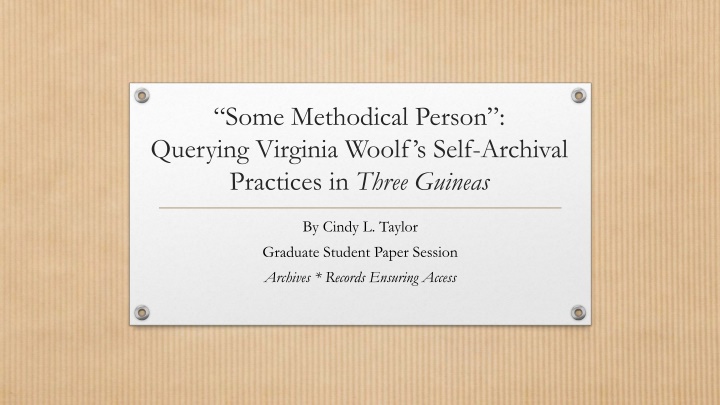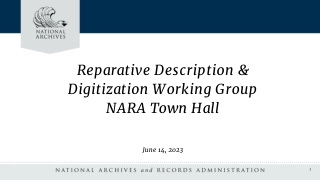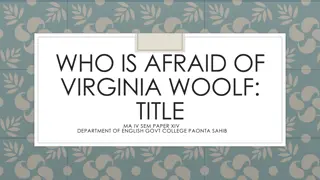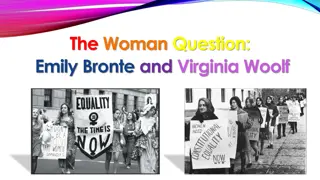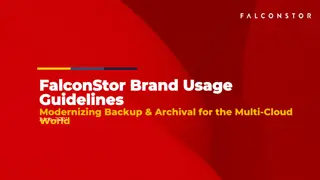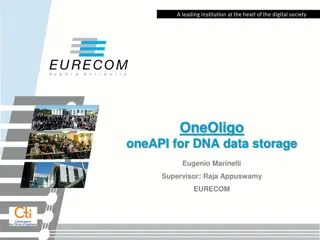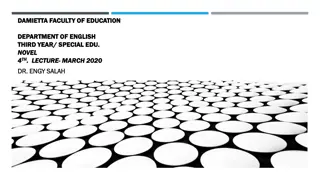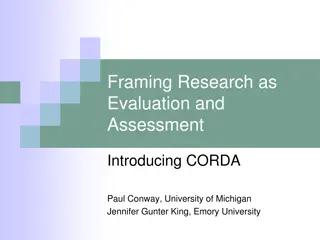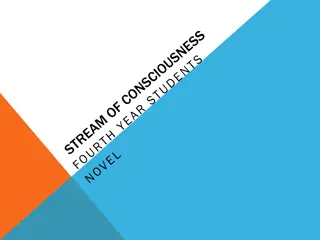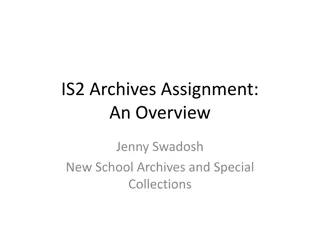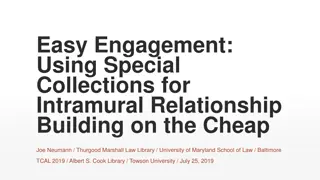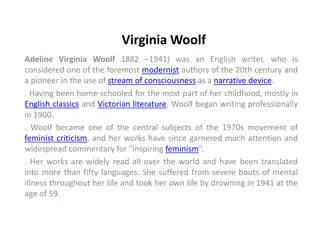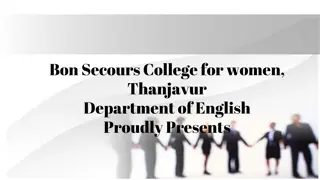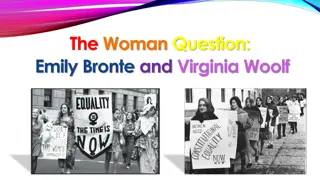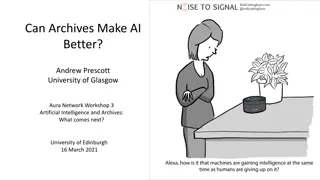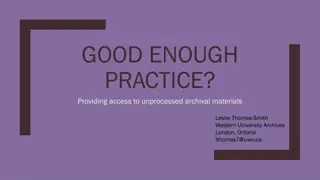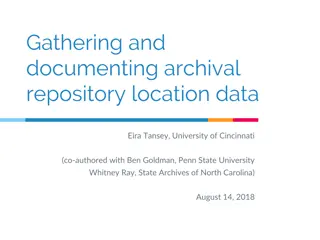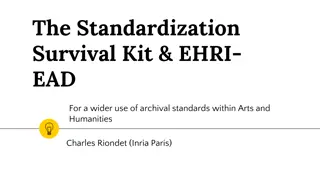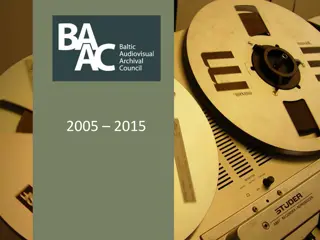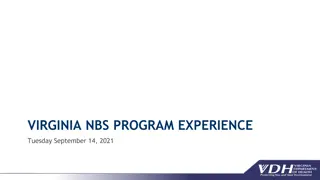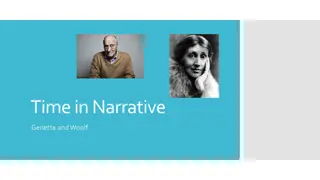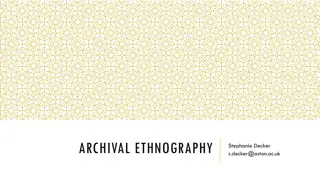Querying Virginia Woolf's Self-Archival Practices in Three Guineas
Analyzing how Virginia Woolf's self-archival practices are depicted in the context of her work "Three Guineas" by Cindy L. Taylor, a graduate student paper which highlights the importance of archives and records for ensuring access to literary history.
Download Presentation

Please find below an Image/Link to download the presentation.
The content on the website is provided AS IS for your information and personal use only. It may not be sold, licensed, or shared on other websites without obtaining consent from the author.If you encounter any issues during the download, it is possible that the publisher has removed the file from their server.
You are allowed to download the files provided on this website for personal or commercial use, subject to the condition that they are used lawfully. All files are the property of their respective owners.
The content on the website is provided AS IS for your information and personal use only. It may not be sold, licensed, or shared on other websites without obtaining consent from the author.
E N D
Presentation Transcript
Some Methodical Person: Querying Virginia Woolf s Self-Archival Practices in Three Guineas By Cindy L. Taylor Graduate Student Paper Session Archives * Records Ensuring Access
Abstract Over a decade-long period, Virginia Woolf collected a carefully curated body of press clippings, articles from various sources, appeal letters, photographs, and copious notes into a series of notebooks, which she would later use as a primary resource archive to support her arguments in her feminist/pacifist manifesto, Three Guineas. In doing so, Woolf became that methodical person whom she hopes, in one of her own copious endnotes, would document the day-to-day evidence of political and social movements of that disquieting decade leading up to the Second World War.
Abstract I will argue that there is a distinction in Woolf s documentation efforts that justifies the nomenclature archive , as opposed to merely an individual collection of materials or personal papers . I will explore issues including the lack of physical, social, and educational access to mainstream archives and libraries, and collecting biases, that inspired and affected Woolf s self-made archival approaches.
Abstract I will explore ways in which the difficulties Woolf encountered, and her motivations for self-archiving, are paralleled by contemporary writers and activists operating outside of the ideological mainstream today. o This will include examining a few current modes of electronic media for the creation, sharing, and use of Outsider Archives . Ultimately, I will query whether, and to what extent, professional archivists should be open to seeking out, collecting, and preserving these Outsider Archives, whether they are the work of the notable or the obscure.
Background Unsatisfied with the available archives and libraries of her day, when not literally excluded from them, Virginia Woolf created her own archives, collection practices, and uses of those materials in order to express wholly new ideas in original ways. the archive is the first law of what can be said . - Michel Foucault, The Archeology of Knowledge
Background In A Room of One s Own, Woolf subverts the ostensible topic of Women and Fiction by instead detailing the difficulties she has encountered in merely attempting to research that topic in archives and libraries, including: Being physically barred from entry Being disadvantaged by a lack of formal education and training in doing research When she does obtain access to the official record, being confronted by the fact that records of women s lives are glaringly absent.
Background Lock up your libraries if you like; but there is no gate, no lock, no bolt that you can set upon the freedom of my mind . All these missing facts about women s historical lives must lie somewhere, presumably, in parish registers and account books , Woolf posits, must be scattered about somewhere, could one collect it and make a book of it . - Virginia Woolf, A Room of One s Own
The Scrapbooks Soon after A Room of One s Own, Woolf began to produce a series of meticulous scrapbooks to document and support her emerging thesis on the links between male dominance, patriotism, imperialism, economics, and war. She would continue that activity for more than a decade. These scrapbooks, which I assert constitute a kind of archive in Woolf s case, what I will call an Outsiders Archive exist parallel to, but quite separate from, the sanctioned and official archives of social hegemony.
The Scrapbooks The core of the collection is formed by three carefully curated scrapbooks drawing on a wide variety of sources: Newspaper articles, reports, and statistics Letters and appeals addressed to Woolf Cuttings from biographies, autobiographies, and memoirs Photographs and poems Manifestoes Cuttings from social and intellectual histories Excerpts from Whitaker s Almanac.
Three Guineas Three Guineas has been variously referred to as an essay, a novel-essay, an anti-war pamphlet, a pacifist polemic, a prose documentary. It can be thought of a feminist-pacifist manifesto . In its pages Woolf, entered a public sphere that had traditionally subordinated women and boldly argued that combating fascism and preventing war are logically inextricable from admitting women to full participation in the public life . - Christine Froula
Three Guineas If the problems with lack of access to research materials she encountered are dramatized and decried in A Room of One s Own, then they are overridden and invalidated in Three Guineas. I thought of the shut doors of the library; and I thought how unpleasant it is to be locked out; and I thought how it is worse perhaps to be locked in - Virginia Woolf, A Room of One s Own
Three Guineas Woolf creates an alternative cultural history to substitute for the one represented in the official archives, and as such she collects contemporary news accounts rather than literary or historical sources as a major current of investigation, where Woolf would use mainstream, conservative newspapers against themselves by frequently selecting letters to the editor, back page and offbeat articles to collect rather than front page news . - Merry Pawlowski
Three Guineas Woolf recommends that the antidote to the overwhelming masculinist, materialist, militaristic rhetoric of society lies not in joining an equally striving, violent opposition, but rather in forming an Outsiders Society . The methods Woolf uses to lend support and ethos to her thesis in Three Guineas are tailor-made for the Outsider: Anna Snaith describes how Woolf s use of quotations and photographs from her scrapbooks demonstrate that these records are still opinion rather than fact, and that it shows all texts to be informed by ideology and opinion .
But, Are Woolfs Notebooks an Archive? The nature and content of what we choose to label archives is a topic for increasing debate amongst archival professionals today. Nothing is less reliable, nothing is less clear today than the word archive . - Jacques Derrida, Archive Fever: A Freudian Impression
Are Woolfs Notebooks an Archive? Archive: Materials created or received by a person, family, or organization, public or private, in the conduct of their affairs and preserved because of the enduring value contained in the information they contain or as evidence of the functions and responsibilities of their creator, especially those materials maintained using the principles of provenance, original order, and collective control . - SAA s online glossary By all of those criteria, Woolf s scrapbooks meet the definition of an archive.
Are Woolfs Notebooks an Archive? In ordering, annotating, and carefully curating her scrapbooks, Woolf assembled a personal archive fitting the later definition. archivists make a distinction between a collection of personal papers and a personal archive . - Edward L. Bishop, From Frass to Foucault: Meditations of the Archive
Are Woolfs Notebooks an Archive? Woolf scholar Lili Hsieh explains that what is important to Woolf is developing her ideas for Three Guineas is her archive : In fact, Woolf s preparation of Three Guineas, her newspaper cutting, note- keeping, and her hoarding letters of response, formed the object, or mediator for her rhetorical aims.
But, is Woolf a Good Archivist? For the Outsider Archivist , the physical condition of the records is of minimal importance. On the other hand, Woolf does index her scrapbooks and creates them in a format designed to preserve original order and provenance. Woolf unapologetically represents the interests of the pacifist, feminist viewpoints she espoused herself she does not attempt balance, objectivity. Hers is a subversive archive a self-serving archive and her appraisal, arrangement, description, and physical treatment of materials reflect that.
Outsider Archives Today Just as Woolf muses in one of her copious endnotes to Three Guineas, It is to be hoped that some methodical person has made a collection of the various manifestoes and questionnaires issued during the years 1936-7, we may equally hope that our own contemporaries are assembling coherent, themed collections of materials comparably compelling today.
Outsider Archives Today Many of her clippings illustrate the impossibility of mutually understood communication between the powerful and subjugated, and thus reveal, why the outsiders, even when there is no question of financial dependence, may still be afraid to speak freely or to experiment openly . - Virginia Woolf, Three Guineas
Outsider Archives Today Gayatri Chakrovorty Spivak in her landmark 1988 essay queries Can the Subaltern Speak? , the question is complicated partly by the dearth of authoritative historical records of subjugated peoples that could potentially lend what Said called the permission to narrate . To echo Foucault, there exists as subjugated knowledge, a whole set of knowledges that have been disqualified as inadequate, located low down on the hierarchy, beneath the required level of cognition or scientificity . - The Achaeology of Knowledge
Outsider Archives Today I suggest two distinct possible solutions for the Outsider Archivist: 1. To collect and then subvert the records of hegemony or 2. To elevate subjugated knowledges by privileging them in an archive of one s own. I believe that in either or both of these ways, marginalized individuals or groups can and dofollow Woolf s lead in creating their own Outsiders Archives today.
Access to Archives and Libraries Today Social and educational access for women: As of the 2009/10 academic year, more than half of all master s degrees and doctorates in the U.S. were conferred upon women. As of the completion of the 2004 A*Census, 66% of U.S. archivists were female.
Access to Archives and Libraries Today Proliferation of archives: The world s national archives number at least 130, including seven national and 50 state archives in the US alone and at least 111 public archives in Britain. National Archives of the U.S. alone boast approximately 10 billion pages of textual records and 133 terabytes of electronic data . Thousands of private archives exist worldwide, including at least three devoted solely to women s records.
Access to Archives and Libraries Today Materialist issues of access, privilege, and archival selection have far outlived Woolf s life span: Societies exist in which women continue to be excluded from education, libraries, and archives. In every corner of the world, many social, religious, political, and ethnic groups continue to struggle with equal representation. Factors of economic and educational privilege continue to favor traditionally powerful groups over marginalized communities.
Access to Archives and Libraries Today Community Archives have proliferated in recent years. However: Mainstream archives grapple with issues of community trust, representation, and staff diversity in accommodating them. Curatorial decisions made in the past created unfillable gaps in the histories of women, minority groups, and other Outsiders. Woolf s decision to collect, arrange, and interpret an Outsider Archive using materials culled from the prevailing society continues to be a valid historical and contemporary approach to filling those gaps.
Access to Archives and Libraries Today The internet has, of course, radically changed the issue of access to archives, records, and written materials of all kinds. However: Let us always be mindful that not all people, in all places possess not only economic, but geographic, social, and educational access to the internet and the ability to use it effectively. Many of those individuals who continue to lack access to the information revolution are the true Outsiders. Only a fraction of existing records are available online, despite valiant digitization efforts by NARA and many other agencies.
Access to Archives and Libraries Today The official, sanctioned archive remains an Insider s institution, by most definitions unlikely to contain many materials by and for Outsiders (although as Woolf found, the historical record may contain copious materials usually negative, prejudiced, and ill-informed ones about Outsiders). Even today, many archives are not open to the general public, are only welcoming to affiliated scholars, and those that are open to the public are frequently open only on days and hours of the week when many non-privileged people are at work.
Access to Archives and Libraries Today Have not diversity and inclusion improved enough in recent years to transform the landscape of institutional archives? The 1970s saw the rise of a vocal minority influenced by the social justice movements of the 1960s and 1970s that demanded minority groups be represented in personnel as well as in the collections, within archival institutions. - Caldera and Neal Howard Zinn in his 1970 address to SAA challenged listeners to, take the trouble to compile a whole new world of documentary material, about the lives, desires, needs, of ordinary people, and much progress has been made in that regard.
Access to Archives and Libraries Today An array of challenges continue when it comes to representation of marginalized groups in mainstream archives: Persistent lack of trust of Insider institutions and differing ideas within the community of how they should be represented Tendency of institutions to place the burden for diversification and representation of an entire group on the shoulders of minority staffers The archival profession has remained slow to diversify: Only 7% of SAA members identified themselves as belonging to a minority ethnicity as of the A*CENSUS 2004.
Who are the Outsiders? Outsiders may include a broad spectrum of groups, including individuals with disabilities, LGTBQ individuals, various age groups ranging from minors to elderly persons, people with mental illnesses or learning disabilities, and anyone with controversial, unpopular, or simply non- mainstream beliefs in areas such as religion, social theories, or politics. Can any one official archive represent all of these groups, let alone do it well?
Are Outsiders Represented? Established professional institutions such as archives and libraries are not neutral entities, but are imbedded in and socially constructed by the dominant culture. - Love and Ramos Once an individual has moved through the process necessary to become institutional staff, can it be argued that she is no longer an Outsider ? Can the un-sanctioned viewpoint, the unpopular position, the social irritant, the controversial voice be heard from inside institutional walls?
Are Outsiders Represented? It is important for individuals, communities, and groups to micro-archive using self-generated collection criteria and to arrange those records in support of self-determined ends. The content collected in these Outsider Archives may be culled from the output of mainstream society or Outsiders may choose to collect the output of their own members or adherents to their own views diaries, meeting minutes, blogs, pamphlets, transcripts, videos, oral histories, and more or both.
Strategies for Outsider Archivists Woolf commandeered a mode of gathering and preserving information that was historically accessible to women and remained highly popular in her day and well afterwards the scrapbook. Even micro-archives as they might be called that is, manifestations of self-archival practices that lack a specific social or political intent could be an invaluable mode of filling lacunae in the histories of obscure lives.
Strategies for Outsider Archivists Woolf subverted the division between public and private by choosing an informal, mixed-media format more familiar at home than in the institution. Her source materials were imminently accessible and her preservation and arrangement methods were, to put it bluntly, cheap. Woolf s Three Guineas notebooks seem familiar to the 21st century user in their methodology, multi-media inclusiveness, currency, and in their effort to pin down and comment more richly upon ephemeral information.
Strategies for Outsider Archivists If websites like Pinterest and Tumblr are the scrapbooks of today, blogs and social media that allow for the collection, display, and meta-commentary of mixed-media objects are the modern equivalent of scrapbooks. o For the socially critical user, the Outsider, these outlets provide an endless ground for collecting and critique of publicly available media. o Those sites use many tactics that would be familiar to Woolf, such as commandeering mainstream media and exposing its underlying values, absurdities, and agendas using wit and incisive commentary.
Can we support Outsider Archives? We can now query whether, to what extent, and how professional archivists should support, seek out, collect and preserve Outsider Archives. One difficulty for archivists today lies in the extremely ephemeral nature of these constructs and in trying to keep up with an endless stream of data. Not all Outsiders possess the resources needed to assemble and/or disseminate their archives online. o Many individuals and groups continue to collect materials via traditional, often creative means.
Should we support Outsider Archives? I am not suggesting that professional archivists champion every cause, or any one cause, espoused by Outsider groups or individuals. I share many of Mark Greene s concerns with the often promoted model of the archivist as activist, preferring the model of the impartial custodian who makes records equally accessible to researches with any and all agendas.
Should we support Outsider Archives? One of Virginia Woolf s chief concerns throughout her career was with illuminating the lives of the obscure, those rendered invisible by their absence from the official record. This remains a valid concern today. There is room within the missions of most mainstream archives to document not only the powerful, influential, and wealthy, but individuals and groups from all walks of life, including those with Outsider viewpoints.
How to support Outsider Archives? Comb internet sources for possible social media collections and blogs of interest to the institution s collecting focus and mission. Harness the power of electronic databases, indexing, web hosting, digitization, metadata, and more to offer new opportunities for parallel collections. Continue to seek out community archives for partnerships and grapple with the challenges they pose.
How to support Outsider Archives? Accept the fact that contemporary Outsider Archives may exist in physical forms consistent with their under-privileged birth. Conceptualize ways in which researchers might utilize Outsider Archives or other micro-archives, and consider how archivists might best index, describe in appropriate language, and make those materials accessible for those research purposes.
In Conclusion Outsider Archives, and ways in which formal or Insider archives and archivists may partner with their original creators, is a rich field for theory. Scholars and individuals of a free-thinking bent of mind will find a new world of resources. Once silent, or at least whispered, voices will be heard by new and larger audiences. Perhaps it is up to us, as archivists, to live up to our reputation as that methodical person who will help to save and amplify these quiet voices for future generations.
Works Consulted Barret, Michele. Reason and Truth in A Room of One s Own: A Master in Lunacy . Virginia Woolf Out of Bounds: Selected Papers form the Tenth Annual Conference on Virginia Woolf. Ed. Jessica Berman and Jane Goldman. New York: Pace University Press, 2001. Bishop, Edward L. From Frass to Foucault: Meditations on the Archive . Virginia Woolf Out of Bounds: Selected Papers form the Tenth Annual Conference on Virginia Woolf. Ed. Jessica Berman and Jane Goldman. New York: Pace University Press, 2001. Caldera, Mary A. and Kathryn M. Neal. Introduction. Through the Archival Looking Glass: A Reader on Diversity and Inclusion. Ed. Caldera and Neal. Chicago: Society of American Archivists, 2014. Derrida, Jacques. Archive Fever: A Freudian Impression. Trans. Eric Prenowitz. Chicago: Chicago UP, 1995. Ericson, Timothy L. At the rim of creative dissatisfaction : Archivists and Acquisition Development . American Archival Studies: Readings in Theory and Practice. Ed. Randall C. Jimerson. Chicago: The Society of American Archivists, 2000.
Works Consulted Finch, Elsie Freeman. In the Eye of the Beholder: Archives Administration form the User s Point of View . American Archival Studies: Readings in Theory and Practice. Ed. Randall C. Jimerson. Chicago: The Society of American Archivists, 2000. Foster, J. Ashley. Subverting Genres and Virginia Woolf s Political Activism: Three Guineas as Peace Testimony . Virginia Woolf Miscellany 83 (Spring 2013): 20 -23. Froula, Christine. St. Virginia s Epistle to an English Gentleman; or, Sex, Violence, and the Public Sphere in Woolf s Three Guianas. Tulsa Studies in Women s Literature 13.1 (Spring, 1994): 27 56. Foucault, Michele. Power/Knowledge: Selected Interviews and Other Writings 1972-1977. Ed. Colin Gordon. Suffolk: Harvester Press, 1980. Foucault, Michele. The Archaeology of Knowledge. Trans. A.M. Sheridan Smith. New York: Pantheon Books, 1972.
Works Consulted Gilliland, Anne J. Pluralizing Archival Education: A Non-Zero-Sum Proposition . Through the Archival Looking Glass: A Reader on Diversity and Inclusion. Ed. Mary A. Caldera and Kathryn Neal. Chicago: Society of American Archivists, 2014. Greene, Mark A. Into the Deep End: One Archivist s Struggles with Diversity, Community, Collaboration, and Their Implications for Our Profession . Through the Archival Looking Glass: A Reader on Diversity and Inclusion. Ed. Mary A. Caldera and Kathryn Neal. Chicago: Society of American Archivists, 2014. Greene, Mark A. A Critique of Social Justice as an Archival Imperative: What Is It We re Doing That s All That Important? The American Archivist 76.2 (Fall/Winter 2013): 302 334. Greene, Mark A. The Power of Meaning: The Archival Mission in the Postmodern Age . The American Archivist 65 (Spring/Summer 2002): 42 - 55.
Works Consulted Hsieh, Lili. The Other Side of the Picture: The Politics of Affect in Virginia Woolf s Three Guineas . Journal of Narrative Theory 36.1 (Winter 2006): 20 52. Humm, Maggie. Memory, photography, and Modernism: The dead bodies and ruined houses of Virginia Woolf s Three Guineas . Signs 28.2 (Winter 2003): 645 663. Jimerson, Randall C. Redefining Archival Identity: Meeting User Needs in the Information Society . American Archival Studies: Readings in Theory and Practice. Ed. Jimerson. Chicago: The Society of American Archivists, 2000. Lee, Hermione. Virginia Woolf. New York: Vintage Books, 1999. Love, Valerie and Marisol Ramos. Identity and Inclusion in the Archives: the Challenges of Documenting One s Own Community . Through the Archival Looking Glass: A Reader on Diversity and Inclusion. Ed. Caldera and Neal. Chicago: Society of American Archivists, 2014.
Works Consulted Marcus, Jane. Annotations and introduction. Three Guineas. By Virginia Woolf. New York: Harcourt, Inc., 2006. Marshik, Celia. Looking for Woolf in the national archives . Virginia Woolf Miscellany 65 (Spring 2004): 7. Middleton, Victoria. Three Guineas: Subversion and Survival in the Professions . Twentieth Century Literature 28.4 (Winter 1982): 405-417. Mills, Jean. Three Guineas: The Movie? Virginia Woolf Miscellany 74 (Fall/Winter 2008): 19-20. O Toole, James M. The Symbolic Significance of Archives . American Archival Studies: Readings in Theory and Practice. Ed. Randall C. Jimerson. Chicago: The Society of American Archivists, 2000. Pawlowski, Merry. Building the Archive of The Reading Notes for Three Guineas . Virginia Woolf Miscellany 65 (Spring 2004): 3 4.
Works Consulted Pawlowski, Merry. Exposing Masculine Spectacle: Virginia Woolf s Newspaper Clippings for Three Guineas as Contemporary Cultural History . Woolf Studies Annual 9. New York, NY: Pace University Press, 2003. 117 - 141 Pawlowski, Merry. Virginia Woolf s Veil: The Feminist Intellectual and the Organization of Public Space . MFS Modern Fiction Studies 53.4 (Winter 2007): 722 751. Silver, Brenda R. The Accidental Archivist . Virginia Woolf Miscellany 65 (Spring 2004): 3 4. Silver, Brenda R. Virginia Woolf s Reading Notebooks. Princeton, New Jersey: Princeton UP, 1983. Snaith, Anna. Wide Circles: The Three GuineasLetters . Woolf Studies Annual, 6. New York, NY: Pace University Press, 2000. Snaith, Anna. Virginia Woolf: Public and Private Negotiations. New York: St. Martin's Press, 2000.
Works Consulted Society of American Archivists. Glossary: Archives . http://www2.archivists.org/glossary/terms/a/archives. Accessed July 5, 2014. Spivak, Gayaatri Chakrovorty. Can the Subaltern Speak? Marxism and the Interpretation of Culture. Eds. Cary Nelson and Lawrence Grossberg. London: Macmillan, 1988. Taylor, Cindy L. Unsolved Problems : Virginia Woolf and Archives of the Mind, from Early Fiction to A Room of One s Own . University of Texas at Austin. Austin, TX. October 11, 2013. Thibodeau, Sharon. Building Diversity Inside Archival Institutions . Through the Archival Looking Glass: A Reader on Diversity and Inclusion. Ed. Mary A. Caldera and Kathryn Neal. Chicago: Society of American Archivists, 2014.
Works Consulted Three Guineas Reading Notebook Website. Southern Connecticut State University. http://woolf- center.southernct.edu/. Winterhalter, Teresa. What Else Can I Do But Write? Discursive Disruption and the Ethics of Style in Virginian Woolf s Three Guineas . Hypatia 18.4 (Fall/Winter 2003): 236 -257. Wong, Vivian, Tom Ikeda, Ellen-Rae Cachola, and Florante Peter Ibanez. Archives (re)Imagined Elsewhere: Asian American Community-based Archival Organizations . Through the Archival Looking Glass: A Reader on Diversity and Inclusion. Ed. Mary A. Caldera and Kathryn Neal. Chicago: Society of American Archivists, 2014. Woolf, Virginia. A Room of One s Own. New York: Harcourt Publishing Company, 1989. Woolf, Virginia. A Writer s Diary. Ed., Leonard Woolf. Houghton Mifflin Harcourt, 1954.
